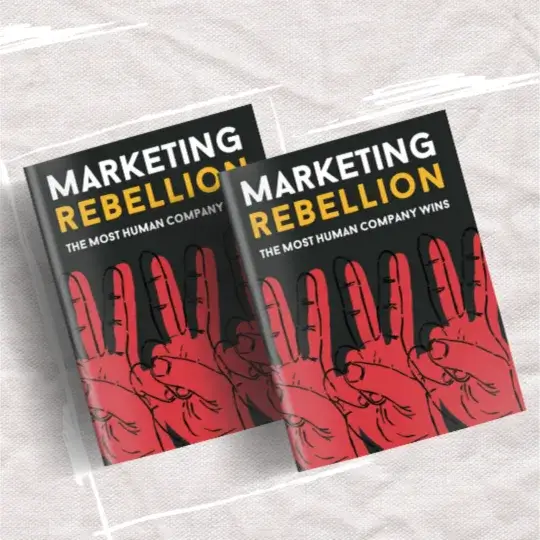Why Mark Schaefer’s ‘Marketing Rebellion’ Is Essential for Modern ROI
Let’s face a critical truth: If your marketing feels like a chore, delivers robotic interactions, and consistently underperforms, you’re operating with an outdated marketing model. We’ve seen it time and again. Mark Schaefer’s Marketing Rebellion Book is not just theory; it’s a necessary strategic reset button. It forces founders and marketing leaders to discard old, interruption-based tactics and build a Human-Centric Digital Strategy that genuinely connects and, crucially, scales predictably in markets like India.
If you are tired of noise and ready to build a brand that is trusted, loved, and effective, this is the foundation you need.

The Strategic Shift: From Self-Serving Tactics to Customer Value
In 10 Reasons, the Marketing Rebellion book acknowledges that customers now hold the power. They are the marketing department. Our strategy must align with their terms.
1. Stop Doing What People Hate. Start Earning Their Love. We delete what annoys us. Your audience does too.
Strategic Action: Immediately eliminate tactics that feel like interruptions (unwanted pop-ups, excessive automated emails). Instead, deliver content that acts as a welcome guest.
Amul does this by turning advertising into timely, witty cultural commentary, and people actively seek it out.
2. Tech Plays Backup. Empathy Leads the Strategy. Technology is a force multiplier, not a replacement for human connection. When tech dominates, the brand loses its soul.
Strategic Action: Use technology (CRM, automation) to listen better, respond faster, and personalize the human touchpoints.
Zomato’s social media banters are backed by lightning-fast, empathetic service; the tech supports the human connection.
3. You Don’t “Own” Your Customers. You Earn Their Belonging. The language of ‘owning’ customers is a strategic dead end.
Strategic Action: Shift your focus from control to community building.
Create a platform (like Tata Tea’s “Jaago Re”) where the audience is invited to participate in a larger, meaningful cause. This builds a sense of belonging that guarantees loyalty beyond product features.
4. Don’t Interrupt. Be Strategically Relevant and Earn the Invitation. No customer wants more noise. They want curated value.
Strategic Action: Your content must be so relevant and valuable that it is invited into the customer’s space.
Nykaa’s content marketing is a masterclass: offering tutorials and inspiration first, so product recommendation feels like a helpful suggestion, not a pushy pitch.
5. Trust Is the Digital Foundation. Without It, Nothing Scales. Every interaction is a deposit or a withdrawal from your Trust Bank.
Strategic Action: Prioritize consistency, clear communication, and non-negotiable delivery of your promise.
Brands like HDFC Bank build trust by eliminating drama, delivering consistent service, and avoiding gimmicks. Trust is earned over time, but lost in an instant.
The Intent Tale Advantage: Making the Customer Your Hero
We integrate these principles from the Marketing Rebellion Book into our G.R.O.W.T.H. Framework to guarantee your brand strategy is always customer-centric.
6. The Customer Is the Hero, Not Your Brand. No one cares about your accolades; they care about their own transformation.
Strategic Action: Position your brand as the trusted guide that helps the customer achieve their desired outcome.
Dove India’s “Real Beauty” campaign centers on the customer’s confidence and story, making the product a quiet supporting role. This is the blueprint for emotional loyalty.
7. Radical Honesty Is Your Highest-Leverage Move. In a skeptical world, vulnerability and honesty build trust faster than perfection.
Strategic Action: Don’t pretend when things go wrong.
When Domino’s India faced product criticism, they publicly acknowledged it and fixed it. This vulnerability is not a weakness; it is a powerful trust accelerator.
8. Don’t Market To Communities. Be Strategically Aware of Them. You must be an active, authentic participant, not an observer.
Strategic Action: Your brand narrative must celebrate the culture and traditions of the market it serves.
Tanishq succeeds because its campaigns celebrate Indian relationships and rituals, not just jewellery. It’s storytelling for the people, not marketing for the market.
9. Speak to Their Why, Not Yours. Your mission statement is irrelevant unless it aligns with the customer’s deeper purpose.
Strategic Action: Lead with the shared values that drive your audience.
Fabindia doesn’t focus on thread count; they focus on heritage, sustainability, and supporting artisans—the ‘why’ that their high-value customers genuinely share. When your ‘why’ reflects theirs, you don’t just sell; you resonate and convert.
10. Strategic Conclusion: The Most Human Company Wins. This is the strategic anchor point: Success in the digital age is not about tactics, tricks, or fleeting trends.
It’s about being real, useful, and consistently earning the invitation into people’s lives.
This is the company we help you build.
Final Word: A Strategy Reset Built for Scale
The Marketing Rebellion book is not theoretical; it is a fundamental shift in Digital Strategy and Execution. It demands that you stop operating on autopilot and start asking better, more human questions. It surprises you to think again.
If you are prepared to shed the noise and build a brand that is trusted, authentic, and engineered for scalable ROI, this is your playbook.
3 Actionable Takeaways for Your Strategy Team (Right Now):
- Audit Your Touchpoints: Identify and eliminate the three most annoying, non-human, or interruptive tactics you currently use.
- Refocus Your Narrative: Rewrite the last three pieces of marketing content, ensuring the customer is the definitive hero, not your product.
- Calculate the Trust Gap: Measure customer service response times and identify how quickly your brand delivers on its core promise. Trust is the foundation of your CLV.
Ready to Build a Human-Centric Strategy That Scales?
CLAIM YOUR FREE G.R.O.W.T.H. DISCOVERY AUDIT and let’s implement these principles into a measurable, full-funnel digital system.
Frequently Asked Questions about the Marketing Rebellion Book
What is the “Strategic Reset” advocated by The Marketing Rebellion Book?
The Strategic Reset is the shift from interruption-based tactics to a Human-Centric Digital Strategy that earns the customer’s love and attention. Since customers now hold the power, brands must move from persuasion to participation.
How should brands use technology in a Human-Centric Strategy?
Technology should act as a force multiplier for empathy. Its role is to help brands listen better, respond faster, and personalize human touchpoints, but empathy, not automation, must lead the strategy.
What does it mean that “The Customer is the Hero, Not Your Brand”?
It means the brand must play the role of the trusted guide, not the star. The customer’s success and transformation become the centre of the story, while the brand provides the tools, clarity, and support along the way.
Why is Trust considered the “Digital Foundation” that must scale?
Trust is the foundation because every interaction online is either a trust deposit or a trust withdrawal. To scale predictably, brands must deliver clarity, consistency, and keep every promise — without exception.
What is the strategic conclusion of the Marketing Rebellion playbook?
The strategic anchor is that The Most Human Company Wins. Long-term success comes from being real, useful, authentic, and continually earning the right to be part of people’s lives; not forcing your way in.
















